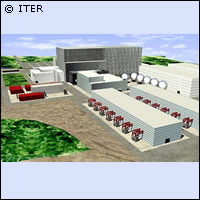ITER parties sign agreement
Representatives from the seven parties to the International Thermonuclear Experimental Reactor (ITER) have signed the agreement establishing the international organisation that will implement the project. The signing ceremony was hosted by French President Jacques Chirac at the Elysée Palace in Paris, and attended by European Commission President José Manuel Barroso and European Science and Research Commissioner Janez Potocnik as well as ministers from the other ITER signatories (China, India, Japan, the Republic of Korea, Russia and the USA). President Chirac described the event as 'a new step on an adventure exceptional in every way', and paid tribute to the researchers, engineers and technicians who conceived, passionately defended and developed ITER. 'It is our duty to undertake the research that will prepare energy solutions for our descendents,' he told the assembled dignitaries. 'The major scientific project that is ITER is one of the most innovative programmes to steer this tremendous change. It is the hand held out to future generations, in the name of solidarity and responsibility.' President Barroso said that ITER would help us to take on one of the most urgent challenges facing humanity: to invent clean and sustainable sources of energy for tomorrow. '[ITER's] official creation today also demonstrates the strength of a united Europe,' he added. 'That is why I can assure you that Europe is fully determined to take on its responsibilities in this project.' The ITER Agreement signed in Paris sets out the necessary provisions for the ITER Organisation to become operational, such as its purposes and functions, its members, legal personality, its Council, Director-General and staff. Once the agreement comes into force, probably during 2007, it will have an initial duration of 35 years. After the signing ceremony, the first meeting of the Interim ITER Council was held under the Chairmanship of Janez Potocnik. 'With the accomplishment of today's meeting, the ITER Organisation is able to embark on its mission, as a worldwide international cooperation, to help create a new source of energy for humankind,' said ITER Director General Nominee Kaname Ikeda. In June 2005 the ITER parties agreed to locate the project at Cadarache in southern France. It is expected to become operational in 2016 and construction costs are estimated at €5 billion over 10 years. When completed, ITER will produce energy by nuclear fusion, whereby two lighter atoms fuse together to make a larger atom, releasing large amounts of energy in the process. Fusion is the energy source that powers the stars.
Countries
China, France, India, Japan, South Korea, Russia, United States

